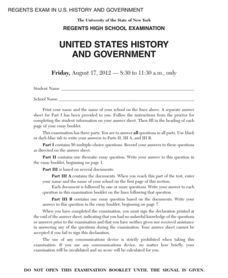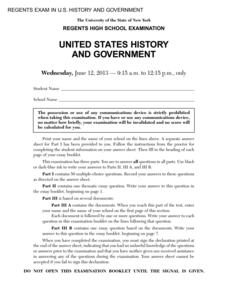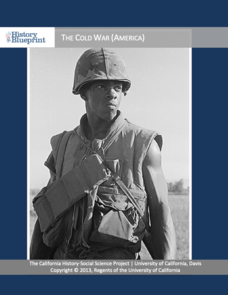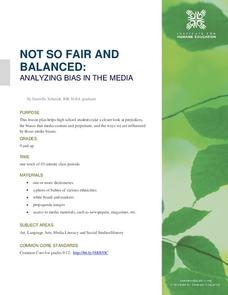New York State Education Department
US History and Government Examination: August 2012
Just how far can the American government go during war time? With primary source documents, learners consider the effects on restrictions of freedom of speech, the detention of American citizens of Japanese descent, and the Patriot Act...
New York State Education Department
US History and Government Examination: August 2013
While the United States is now one of the strongest countries in the world, at its founding, it was plagued by controversies over the ratification of the Constitution, the Louisiana Purchase, and the expansion of slavery. Using a...
New York State Education Department
US History and Government Examination: June 2013
How successful has American foreign policy been in the past? Pupils consider the question as part of a state examination in American history. Other prompts include a document analysis and essay of important civil rights cases decided by...
New York State Education Department
US History and Government Examination: August 2014
The Gulf War, the Vietnam War, and the Korean War all featured pivotal moments in United States foreign policy. Individuals consider how these conflicts changed the course of American diplomacy using an essay prompt and documents from a...
New York State Education Department
US History and Government Examination: June 2014
The 1960s marked a pivotal point for social and foreign policy in the United States. Using documents, such as speeches from Martin Luther King Jr. and John F. Kennedy, and authentic test prompts, class members consider the impact of this...
New York State Education Department
US History and Government Examination: January 2014
What led the United States to acquire territory? What were some of the effects of those acquisitions? Learners explore the questions using the 2014 essay from the New York Regents exam. Other items include practice multiple choice...
University of California
The Cold War (America)
The Cold War—with its roots in World War II—impacts the world today. Using an extensive curriculum, scholars consider its impact through primary sources, including speeches and propaganda, as well as other skills-enhancing activities. An...
History with Peters
A Clear Signal for Change: Multiple Interpretations and Nat Turner’s Rebellion
Was Nat Turner a hero or a violent criminal? Using primary sources and images that discuss the rebellion of enslaved people he led in antebellum Virginia, scholars consider the question. Then, they create memorials to Turner and...
University of Texas
Understanding Migration
Human migration—often the result of push and pull factors—sometimes has dramatic outcomes for both those leaving their homelands and the host countries. Using a variety of case studies, learners consider those issues. Then, by completing...
National WWII Museum
Women and the War: Supporting Historical Interpretations
Rosie the Riveter may be an iconic image from World War II, but not all historians agree on how the conflict affected women in the workplace. Individuals evaluate the writings of well-known historians on the topic, and then decide: Was...
Constitutional Rights Foundation
Criminal Justice in America
The allure of true crime television shows often leads to intrigue of the criminal justice system. Using a six-unit curriculum, learners explore criminology and the justice system in the United States. Topics include the police, trial...
PBS
The Supreme Court: Civil Rights and Civil Liberties
While World War II changed the international order, it also led to a fundamental shift in the concept of civil rights within the United States. Using a video and discussion questions, class members consider the effects the war had to the...
University of Richmond
The Forced Migration of Enslaved People 1810-1860
Slavery not only involved the forced migration of African people from their homes, it also meant the forced removal of people within the United States. Using data and interactive graphics, scholars see how the tragedy of human slavery...
National WWII Museum
The Red Ball Express: Statistics as Historical Evidence
Historians use all kinds of information to make conclusions ... including statistics. Young scholars examine how two historians evaluate The Red Ball Express—a supply line staffed primarily by African Americans—using numbers. The...
Echoes & Reflections
Perpetrators, Collaborators, and Bystanders
After the Holocaust, the world grappled with how to bring justice to the Nazis. But what to do with the thousands—if not millions—who allowed it to happen? Young historians consider the issues of guilt, collaboration, and responsibility...
National WWII Museum
Evaluating the US Decision to Drop the Atomic Bombs
While the use of the atomic bomb was the definitive end of World War II, the terrible weapons left new questions. Young scholars use primary sources and analytical worksheets to consider the implications of the fateful decision. Then,...
National Endowment for the Humanities
Revolution '67, Lesson 1: Protest: Why and How
To some people, protesting is as American as apple pie, but the factors that lead to protests can be as confusing to veteran activists as to today's youth. Revolution '67 explores the riots in Newark, New Jersey as a case study. Using...
Council for Economic Education
The Economics of Income: If You’re So Smart, Why Aren't You Rich?
If basketball players make more than teachers, why shouldn't learners all aspire to play in the NBA? Unraveling the cost and benefits of education and future economic success can be tricky. Economic data, real-life cases, and some...
Helena-West Helena School District
I Know Why the Caged Bird Sings Instructional Unit Plan
Maya Angelou's first autobiography, I Know Why the Caged Bird Sings, demonstrates both the author's exemplary writing and the themes of gender and racial injustice that perpetuate beyond the limits of the 20th century. Use a thorough...
Institute for Humane Education
Not So Fair and Balanced: Analyzing Bias in the Media
Life is not always fair. Who's heard that before? This same concept moves to a larger scale using prejudice and bias. Pupils discuss where prejudice attitudes derive and how they develop throughout life. Reading comprehension...
Society for Science & the Public
Easter Islanders Made Tools, Not War
When studying artifacts, especially tools, how do archaeologists determine what the devices were used for? In what ways might researchers' previous experiences influence their perception of an artifact? An article about researchers'...
PBS
Analyzing McCulloch v. Maryland
What happened in the Supreme Court case of McCulloch v. Maryland? The resource teaches the specifics of the case with a video and provided discussion questions covering issues such as precedent and the Supreme Court as an equal branch of...
University of Pennsylvania
Mock Trial of Alfred Dreyfus
What if scholars based mock trials on history? The fourth installment of a five-part series on the Dreyfus Affair asks learners to read various pieces of evidence before conducting a mock trial for a French officer. Teams answer...
Constitutional Rights Foundation
Puritan Massachusetts: Theocracy or Democracy?
Was Puritan society governed as more of a theocracy or democracy? After comparing and contrasting a series of primary source documents, middle and high schoolers form small groups and debate the question.

























